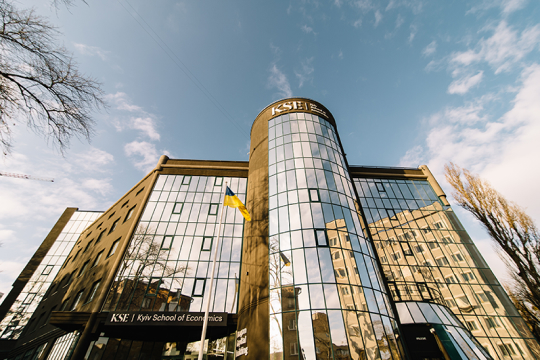Strengthening Sanctions Against the Russian Federation
The International Working Group on Russian Sanctions aims to provide expertise and experience to governments and companies around the world by assisting with the formulation of sanctions proposals that will increase the cost to Russia of invading Ukraine and that will support democratic Ukraine in the defense of its territorial integrity and national sovereignty. The group includes international and Ukrainian experts, including members of Kyiv School of Economics.
The International Working Group on Russian Sanctions has presented Working Paper №19 “Strengthening Sanctions Against the Russian Federation” – Action Plan 3.0. The document provides an analysis of the impact of the sanctions imposed on Russia and offers recommendations that will reduce the resources of the Russian Federation and thereby hasten the end of Russia’s invasion of Ukraine.
Western sanctions have hampered the Russian economy, affecting specific sectors, individuals and access to finance and technology. Sanctions led to a 1.2% contraction in GDP in 2022, with export revenues falling by $180 billion (10% of GDP in 2023) and half of Russia’s official reserves – $300 billion – becoming inaccessible. Gazprom’s export revenues fall by $70 billion in 2023, affecting the state budget. Many companies have reduced their operations in Russia, affecting technology transfer and management expertise. More than a million Russians have emigrated since the start of the full-scale war, affecting labor supply and productivity.
Without sanctions, Russia could have maintained its dominance of energy supplies to Europe, access to Western finance and technology, unfrozen assets abroad and unimpeded travel to the West. While the current sanctions are not perfect, they have significantly weakened Russia’s ability to wage war in Ukraine. Going forward, proactive measures and improved enforcement are needed to make sanctions more effective in ending Russia’s invasion of Ukraine.
Current sanctions must be enforced more effectively, and additional sanctions with severe and lasting economic consequences for Russia should be imposed to help end the war. In particular, the sanctions coalitions should:
• Confiscate frozen Russian assets abroad to fund military and financial aid to Ukraine for the duration of the war;
• Implement new sanctions on Russian exports, targeting sectors such as pipeline gas, LNG, nitrogen fertilisers and metals, while strengthening existing sanctions with a focus on uranium, aluminium and steel. Moreover, the sanctions coalitions should reinforce the price cap, subsequently reducing it to $50 per barrel, alongside the implementation of measures to restrict exports of oil and gas technology and services to Russia;
• Impose import tariffs on all remaining Russian exports. The West no longer applies the Most Favored Nation tariffs to Russia, and the allowed WTO-bound tariffs are very high;
• Strengthen technology bans, including tighter restrictions on microelectronics, CNC machines, software and defense sector components, and proposing a CoCom-style technology embargo committee;
• Tighten financial sanctions by restricting international financial transactions, reducing liquidity and credit availability, and imposing full blocking sanctions on all Russian banks and key financial institutions to prevent Western banks in Russia from exploiting loopholes for war profiteering;
• Impose more sanctions on Russian companies, particularly in the energy and metals sectors, such as Gazprom and Rosneft, which are crucial to Russian government revenues and military operations, with Rosatom also targeted for sanctions;
• Impose more personal sanctions on government and private figures supporting Russia’s war, coordinate across key jurisdictions, and share information to justify these measures in court;
• Prevent lawyers from enabling sanctions evasion, especially American lawyers who offer confidentiality and fewer reporting requirements;
• Designate Russia as a sponsor of terrorism to increase the legal and moral costs for countries that continue to trade with the aggressor;
• Stop Western companies doing business with Russia, with sanctions for those who continue to profit from Russian activities;
• Strengthen enforcement of existing sanctions by allocating more resources to the authorities and sanctioning Western service providers, including law firms, that assist in sanctions evasion;
• Expand secondary sanctions to hold individuals and companies in countries such as the UAE, Turkey, Central Asia, the Caucasus and China accountable for aiding sanctions evasion and to deter them from supporting Russia’s war efforts.
The new Action Plan 3.0 aims to expand sanctions against Russia, with the package outlining two strategic objectives for implementation.
First, the sanctions coalition should put together a package of sanctions to reduce the economic resources available to Putin to support his invasion of Ukraine by $70-80 billion per year, compared to 2023. To do this, the sanctions coalition should: (1) enforce the current oil price cap to reduce revenues by $25 billion, (2) impose additional sanctions on key exports plus a tariff for a further $25 billion reduction, and (3) consider a $10/barrel reduction in oil price caps after successful enforcement for a further $25 billion reduction.
Second, the West needs to implement export restrictions that can contain an expansionist and revisionist Russia, like during the Cold War, including a new CoCom-like organisation, systematic sanctions on critical sectors, a ban on Western companies in Russia (with limited exceptions), and measures to counter Russian evasion and disinformation networks.
These measures are essential for the sanctions coalition to contain Russia’s military aggression and end its war in Ukraine.
Contacts


